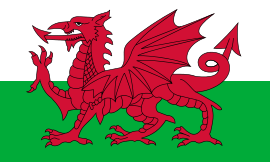Holidays in Wales

| Part of a series on the |
| Culture of Wales |
|---|
 |
| History |
| People |
|
Traditions
|
|
Mythology and folklore |
| Religion |
| Art |
|
Music and performing arts |
|
Monuments |
|
These are the main holidays traditionally celebrated in Wales that are not shared with the rest of the United Kingdom. Except for those that fall at the same time as UK public holidays, none of these holidays are bank holidays. There is, however, much support for the recognition of St David's Day as a bank holiday in Wales, in the same way as St Patrick's Day in Northern Ireland, and St Andrew's Day in Scotland.
Many of the seasoned festivals originate in the Celtic culture of Wales, as does the manner of their celebration.
Historic Practice
As recorded in the Laws of Hywel Dda, the three main holidays (gwyliau) of the medieval Welsh kingdoms were Christmas (Nadolig), Easter (Pasg), and Whitsuntide (Sulgwyn).[1]
Other important holidays were the feasts of St Patrick (Gwyl Badric) on 17 March; St. Quiricus (Gwyl Giric) on 16 June; the Beheading of John the Baptist (called in Welsh Gwyl Ieuan y Moch – St. John of the Swine – as it was the day the pigs were turned out into the woods to forage through the winter[2]) on 29 August; St Michael (Gwyl Fihangel) on 29 September; and the Calends of Winter (Calan Gaeaf) on 1 November, All Saints' Day (yr Holl Saint).[3] A special drink called the "liquor of the Apostles" (gwirawd yr ebestyl) was brewed for and distributed on these saints' days.[4]
Saints' Days
St. David's Day
The patron saint of Wales is St David, Welsh: Dewi Sant. St. David's Day (Dydd Gŵyl Dewi Sant) is celebrated on 1 March, which some people argue should be a designated national holiday.
Gŵyl Mabsant
On a more localised level, each parish celebrated a Gŵyl Mabsant in commemoration of its native saint. This annual celebration developed from a dedication through prayer to a programme of recreational activities.
Dydd Santes Dwynwen
Celebrated on 25 January every year, Dydd Santes Dwynwen (the day of Saint Dwynwen) is the Welsh day of love much like St. Valentine's Day.
Gŵyl San Steffan
Celebrated on 26 December, in Wales Boxing Day or St. Stephen's Day is known as Gŵyl San Steffan.
Seasonal festivals
Nos Galan and Dydd Calan
1 January: The Welsh New Year's Eve and Day celebration involving the tradition of giving gifts or money Calennig to celebrate the new year.
Gŵyl Fair y Canhwyllau
2 February: Literally translates as "Mary's Festival of the Candles", and it is equivalent to Candlemas and Imbolc. In Paganism, the Welsh holiday name is just Gŵyl y Canhwyllau, meaning "The Festival of Candles".
Alban Eilir
20–21 March: Spring Equinox, a time of festival and drinking, the middle of Spring.
Calan Mai or Calan Haf
1 May: May Day, a time of festival and drinking, the first day of summer and the Welsh equivalent of Beltane.
20–21 June: Alban Hefin, a time of festival and drinking, (Summer Solstice)
24 June: Gwyl Ifan (St John's Day), a time of festival and drinking, otherwise known as Midsummer's day.
Calan Awst
Around 1 August: The first day of Autumn, a time of festival and drinking, the Welsh equivalent of Lughnasadh, or Lammas.
Alban Elfed
22–23 September: Autumn Equinox, a time of festival and drinking, the middle of Autumn.
Nos Galan Gaeaf and Calan Gaeaf
31 October and 1 November: Winter's eve and the first day of winter. A Hallowe'en or Samhain-type festival.
Alban Arthan
21–22 December: A Winter Solstice or Midwinter festival, a time of festival and drinking, the shortest day of the year.
Eisteddfod
This poetic tradition has been celebrated in eisteddfod, a Welsh word meaning a gathering where people recite verses and sing songs.
External links
- A list of other Medieval Welsh saints' days at Aberystwyth University (under "gwyl")
References
- ↑ Wade-Evans, Arthur. Welsh Medieval Laws, p. 2. Oxford Univ., 1909. Accessed 31 Jan. 2013.
- ↑ Roberts, Sara E. Llawysgrif Pomffred: An Edition and Study of Peniarth MS 259B. Brill, 2011. Accessed 31 Jan 2013.
- ↑ Wade-Evans, Arthur. Welsh Medieval Laws, p. 343. Oxford University, 1909. Accessed 31 Jan 2013.
- ↑ Wade-Evans, Arthur. Welsh Medieval Laws, p. 341. Oxford Univ., 1909. Accessed 31 Jan. 2013.